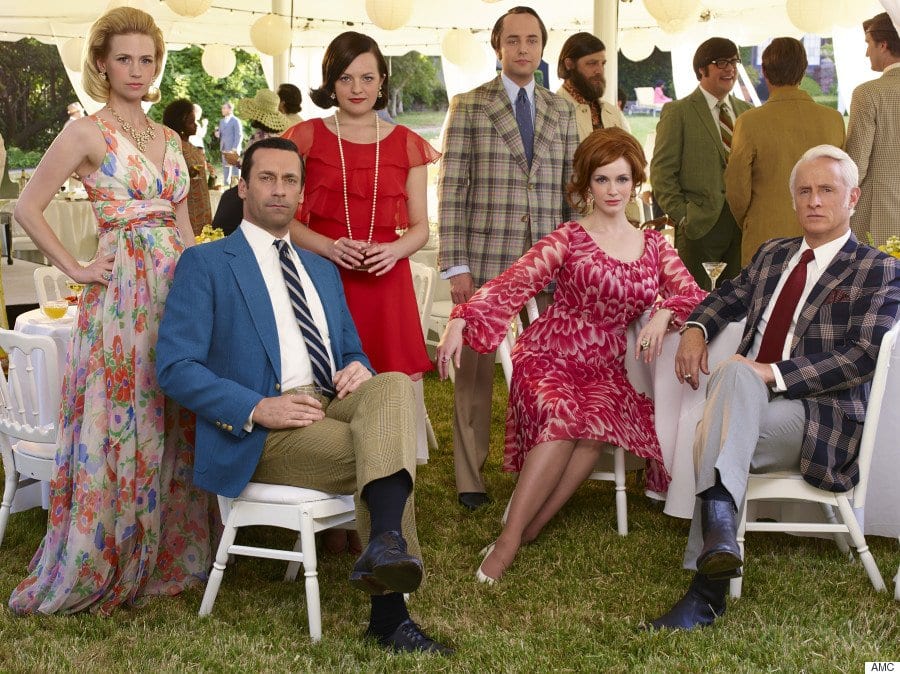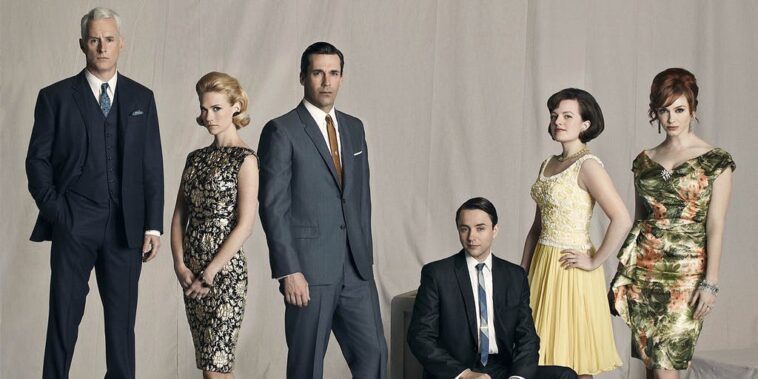The air of silent death has overshadowed the latter half of the Mad Men series. Through all of their personal and professional changes, each character has grown more cognizant of the importance of their lives. The final two seasons of the series show decisions being made solely to satisfy the needs of the future rather than the desires of the present. The older characters begin to realize through Seasons 6 and 7 that their way of life and the way they do business is becoming a way of the past. The younger characters recognize that they are the ones becoming the bosses and are to be tasked with all that comes along with making decisions and directing the company in future endeavors. For each age demographic, going through such changes leaves everyone primarily concerned with the legacy they will leave behind.
For some, a personal legacy is all that they are concerned with — the one great ad, perhaps, that will become so legendary that everyone will know who created it. For others, their personal legacy is wrapped up in their business dealings, intent on leaving a door with their name on it after they pass. Then there are those who desire to leave a personal legacy that only they can recognize, to learn oneself and achieve an unparalleled level of self-discovery, to live the life that only they can. Whatever the motivation, the final two seasons of Mad Men illustrate the drive of those to leave something behind, to prove that they were here, and the various ways that people go about bringing that desire to fruition. Often, the closer one gets to the end of their life, the more introspective one becomes, bringing to light regrets from their past, or wrongs they feel they may have done others. Throughout the final two seasons of Mad Men, many characters reflect upon the people they’ve shared their lives with, mistakes that have been made, and begin to look within themselves to see what they want out of the time they have left on earth. They begin to discover the societal constructs they were beholden to didn’t make them as happy as they expected, nor did abiding by the expectations of others. It becomes clear, in a way that only traversing one’s life can, that we must look within ourselves and satisfy our individuality because no matter where we go or how many offices we walk out of, we can never outrun ourselves.
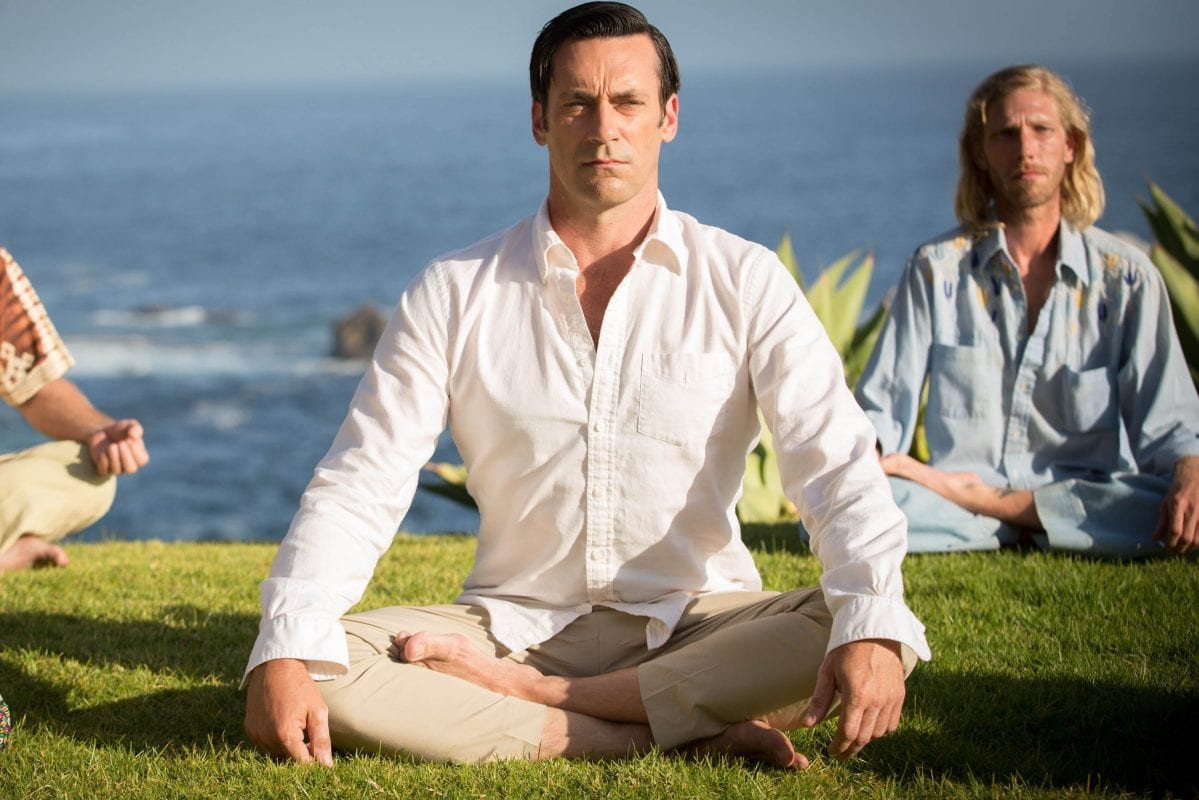
Don Draper
Season 6 of Mad Men opens with Don and Megan on a Hawaiian beach narrated by his voice as he reads Dante’s Inferno, the first warning in a long line of forewarnings that we are to see a fiery journey through a hell-like existence of those we have come to know throughout the series. While in Hawaii, gaining research for an account because nothing is ever a vacation for Don, he is approached by a soldier getting married who asks Don to give his bride away. Reluctantly, Don agrees, claiming that his hesitation comes from a place of fondness for the couple not wanting them to look back on photos of their wedding and see a stranger playing such a pivotal role. In reality, though, being around the service member reminds Don of the name he stole after accidentally killing his commanding officer. Back in New York, Don almost steps into an empty elevator shaft when the doors open to reveal nothing but darkness below. This event shakes him as he gets closer to death with each passing day. Roger’s mother passes away, and Don vomits while words are being delivered on her behalf with friends and family gathered in her home. Death surrounds his life and seems to present itself repeatedly, a presence so prevalent he can’t escape it. A pitch to Royal Hawaiian goes south when the imagery Don has imagined makes all those who hear it think of death or suicide, companions Don has grown accustomed to keeping close. He’s the only one who doesn’t see the image of a man shedding his close walking into a body of water with only the horizon in sight as a picture associated with a man giving up on life. At the very least, it reveals a subconscious desire of Don’s to escape and reinvent himself, at the worst, a feeling that nothing else can be done to fix his life and the beginnings he loves don’t last forever, and the only answer is a permanent ending.
Don meets a character that fascinates him in Season 6, a surgeon that lives one level below him. The surgeon, Arnold Rosen, comes into his life when both characters are in their apartment lobby at the same time and witness their doorman have a heart attack. Arnold saves the man’s life, and Don is stricken with the idea of facing death every day and having control over the lives of others. Don also proves that he has returned to his old ways when it is revealed that he is having an affair with Arnold’s wife, Sylvia. Don started out the series having his affairs as far away from home as possible, steadily growing closer until now his mistress lives just a floor below his wife. Does this signify an arrogance in Don, or does he simply no longer care as much to keep his infidelities a secret? The latter seems probable, as more and more people have learned of his philandering ways, he has to hide his infidelities from fewer people because they already know who he is. When she asks if it bothers him to have dinner parties and sit across from his wife and her husband, Don replies in a line he’s used before: “No, because this never happened.” The ability of Don’s to push out of his mind that which he doesn’t want to think about is a coping mechanism that proved necessary after a childhood and adolescence filled with abuse. Death presents itself again when Megan tells Don that she had a miscarriage. Don seems flummoxed at the idea of having more children, and the time is not right for Megan either, but the possibility of having another baby further highlights the age difference between him and Megan. Megan is also keen on accepting the changing times and the proto-seventies free love lifestyle brought about by the incoming decade. When Megan and Don attend a dinner meeting with the writer of the soap Megan is acting in, the two are asked to join them as swingers. Don feels uncomfortable and repeatedly refuses; Megan refuses too but seems far more at ease with the idea than Don. Don is looking for reasons to lash out at Megan. While visiting the set of the soap, he sees her perform a kissing scene, and he starts a fight with her, yelling about how much she appeared to enjoy the intimate presence of another man. Megan is working; she has never sought companionship outside of their marriage, unlike her husband. Don can’t handle Megan’s success because he had nothing to do with it. When she was working as a copywriter, Don was involved, and any accomplishment she enjoyed was in his business, so he was congratulated just as much as she was. Through her acting, Megan has become independent and determined and less dependent upon Don. We know Don struggles with her work taking her away from their home, he’s repeatedly questioned if she has to rehearse and go to as many classes as she does. No matter how progressive he is in some areas, Don still expects a subservient wife who is home by the time he arrives from work with dinner on the table. Megan admits to herself and others that she is not happy in her marriage and feels alone, eventually telling Don that something has to change. Their relationship is doomed, and the overwhelming presence of divorce looms over the final two seasons of the series. It was always only a matter of time before they realized they couldn’t sustain a
married life when they were such different people wanting to go through life in such opposite directions.
Their marriage gets a stay of execution when Don tells Megan he’s taken an opportunity to move to California where a branch of the agency will open to service west coast clients. Megan is elated to try her hand at acting in Hollywood and, despite her initial shock and reservations, looks forward to the move as a positive step in both her career and in her marriage. When Don changes his mind and stays behind in New York to let Ted move to California in his place, Megan is furious; already written out of her soap, it is too late for her to back out, signaling the beginning of the end of their marriage. Don recommits himself briefly to Megan but only because all of his other options have been exhausted. Sylvia has ended her affair with him, and a one-night stand with Betty proved to be just that when Betty told him “I like my life.” Don’s cynicism and Megan’s humanism continue to wedge them even further apart than living on opposite coasts does. Their responses to the civil unrest that dominated the mid to late 60’s couldn’t be any different, and as more of their personalities are revealed, they learn how different they are and how far apart they have grown. When Megan is overcome by the story of their neighbor whose son was drafted, she asks Don if he has any connections that could get him out of serving. Don responds by telling her he was looking for trouble by sending his draft card back in protest. He eventually helps but only because of his preoccupation with death rather than the altruistic motivations of Megan.
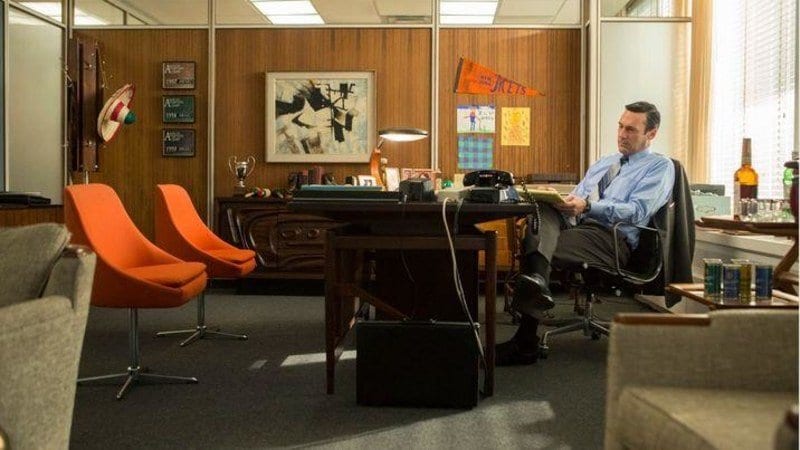
Professionally, Don is floundering, having difficulties making a place for himself in an office in which he feels increasingly disconnected. The laid-back, casually dressed, pot smoking creative staff make Don stick out like a sore thumb in his suit and tie. He looks as out of place as he feels, and his reluctance to adjust has him digging his heels in the sand. The loyalties that have been broken in his career are at their most profound pain when Don sees Peggy walking into a Heinz pitch that only SCDP was supposed to know about. Peggy gained this information due to her regular correspondences with her former SCDP co-workers. He listens to her give her pitch after the doors close and overhears her repeat his famous line, one she tells the client she always says: “If you don’t like what’s being said, change the conversation.” Don knows how talented Peggy is, and he also knows just how much he took her for granted. A professional regret of Don’s includes not valuing Peggy enough leading to her departure from his agency.
Don’s pitches are becoming more about him than ever before. His desire to escape himself, and perhaps life, is made clear by an ad that evokes thoughts of suicide. In the Heinz pitch, Don goes against clear indications of what the clients are looking for, but it is not in his typical way because he knows what’s best for the ad, it’s because he needs to leave a legacy. Any other time Don has disagreed with a client, it is because the client was naive about advertising or needed a push towards a bolder strategy, but this time Don almost whines through the meeting and is persistent like a child demanding desert before dinner. Don doesn’t care about what the client wants; he cares about what he wants.
The ultimate example of Don using the pitch meetings as his therapy was when he confused the pitch to Hershey as a confessional and came clean about his past and family. The family chocolate company looking for a marketing strategy instead of one of the creatives beginning work on a memoir are stunned to hear Don proclaim that he was raised in a brothel. They also don’t know what to do with this information; neither do Don’s partners when he begins to cry before leaving the office for the day. Don is put on an indefinite leave from work to collect himself and “rest” before being allowed back to the office, a sentence he does not take lightly. This is another in a trail of truths that he hides from his family hoping to return to work before anyone would notice. Much to the surprise of the rest of the agency, Roger invites Don to come back to work, then waits until after lunch to show up at Don’s first day back at the office, a ceremonial return that was a surprise to the staff. There was bedlam in the office on Don’s first day back, as most of the agency thought that his ‘leave’ was a way to fire him so he could save face. When Roger reminds the partners that firing Don would require them to buy out his partnership, money that the agency doesn’t have, so they hire him back with stipulations he must abide by, rules that rob the very essence of Don’s working personality. Don is given Lane’s old office as a punishment, yet another constant reminder of death surrounding Don, and is told to work on his first project under Peggy who assigns him to write taglines. Don toes the line, following all the rules and regulations but even though he is the most levelheaded and cool-tempered we’ve seen him all series, he begins to realize that he will never make amends for his behavior and the pain he caused the rest of the office.
Don struggles to work at such a large agency in McCann Erickson. He longs for the days when he worked under just two partners, without a contract, of course. Don wants to come and go as he pleases without answering to anyone. He has grown resentful of partners meetings and budgetary discussions and all that comes from starting one’s own agency. Don still wants to make decisions as if he is the only one with a valid opinion on the matter. Tired of being bullied by Herb from Jaguar who only brought his business to SC&P after a night with Joan, Don ends his agency’s relationship with his company. Claiming that Herb was going to leave the agency anyway does little to soften the blow of his account, especially for Joan. Joan preferred to stay away from Herb when he visited the office, but Don taking things upon himself and making a decision for everyone based on his distasteful feeling regarding the situation with Herb upset her, and the rest of the company. Don’s lightning in a bottle is no longer worth it to his co-workers and partners; the stress that comes with Don’s creative genius is costing those with whom he works emotionally and financially.
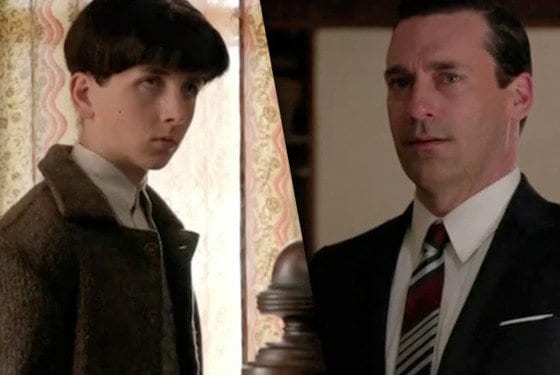
Don’s history is a secret he’s kept from everyone, but especially his children, and in Season 6 we finally understand why. Don’s childhood wasn’t marked only by abuse, neglect, feeling unwanted and shuffled around; it was also marked by rape. Don lost his virginity when he was raped by a disgruntled prostitute working in the brothel his Uncle and Aunt ran with whom Don and his step-mother moved into after his father’s death. This fact about Don allows us to understand aspects of his personality that were before assumed to be the result of chauvinism or maintaining the patriarchy that keeps him in a superior position to many others. Most of Don’s life, however, can be understood by the sexual abuse he endured and how the adults in his life viewed him when he was a child. Don feels the need to dominate women because he was dominated and violated. His adult sexual encounters have been characterized by his telling women what to wear and how to please him in an attempt to gain some of the autonomy he lost during childhood. This abuse helps us understand why Don is so intent on forgetting the past and not letting events that cannot be changed dictate the future.
We can also understand why Don was the only person that could help Peggy in the way that she needed immediately following her unexpected pregnancy. Don knows what it was like to be unwanted, and he knew better than anyone else that Peggy had ambitions beyond motherhood at the time her child was conceived. He knew that her decision to place her child for adoption was the best decision for both of them which is why he supported her when no one else did. His history helped him determine that the pain Peggy would feel in her decision would be nothing like the pain of feeling unwanted. “Forget this. It will shock you how much this didn’t happen” is what Don told Peggy in the hospital just after she gave birth, and this mantra is one Don has repeated to himself to help him through the emotional trauma of his sexual abuse. The rape of Don by a prostitute also explains why he refused to vote on whether or not the agency should have any dealings with Herb when he was seeking to buy sex with Joan in exchange for a chance at Jaguar’s business. The rape coupled with the abandonment he endured as a child led to Don’s feeling like he didn’t deserve love leading to the breakdown of all of his marriages and presenting himself in the most negative way possible. If Don can prevent people from getting close to him, he can save himself from what he sees as the inevitable result that he will be proven unworthy of love and abandoned again. Don’s childhood rape came at a time when he was being cared for while sick. His surrogate mother took advantage of his weakened state and sexually abused Don leading to his disconnected relationship with his children. He admits to Megan that he doesn’t love his children as he expected, and instead feels cold and distant toward them. Don never experienced a healthy relationship with his parents or saw what a parent-child relationship is supposed to look like leaving him handicapped and unable to provide his children with the emotional support they need. The breaking of Don’s trust for authority figures that he endured as a result of the rape and the feelings of worthlessness at his father’s lack of love toward his unwanted son left Don with emotional wounds that he’s unequipped to heal. This trauma is the reason Don runs from everything, and why he has been so intent to escape the suffocation of his past. The rape has haunted Don his entire life and was expertly foreshadowed for viewers in the fifth season when Don dreams of strangling a woman to death who tried to have sex with him and refused to take no for an answer. Up until the point where Don’s rape is revealed onscreen, each of his reprehensible behaviors was thought to be blamed on his abuse and neglect endured through childhood or were traced back to wanting to keep his superiority as a white male intact. Once one learns that there was a sexual component to his abuse, a full picture of Don Draper emerges and his character, tragic as it is, becomes easier to understand.
Don gets a divorce, sells his apartment, learns a lover has died and loses the company he helped found all within the span of a few episodes in the final season of the show. Don’s life is in turmoil, and what does Don Draper do everytime he is in turmoil? He runs. McCann Erickson, in an impressive feat of longball strategizing, buys out SCDP, absorbing their profitable clients and throwing the scraps toward other agencies. For some, this works out, as they are given chances for companies they’ve always wanted, but for Roger, Joan, and Don, they struggle. Joan isn’t taken seriously, Roger is viewed as outmoded, representative of an ad man that no longer exists, and Don can’t handle being in a creative meeting with a researcher and a room full of so many employees that box lunches are necessitated rather than the tray full of cookies that SCDP would have put out. Don is a cog in a wheel at this company and will never stand out or even get the chance to work on anything without going through a seemingly endless chain of supervisors. In typical Don fashion, he walks out of the over-crowded meeting and hits the road on something of an impromptu world tour. Along the way, he stays at a family-owned hotel where he is invited to a fundraiser full of veterans to help a fellow veteran in the community after his house burned down. Initially reluctant to attend and face his service record and his identity theft, Don not only attends but also shares with the men that he accidentally caused the death of his commanding officer. The Don Draper we met in Season 1 would never have shared that information, so we see that Don has come a long way in accepting his past. Maybe he can finally live comfortably enough with his past to have a future where he doesn’t have to feel as though he’s on the brink of being on the run again. Don leaves the hotel and starts work in a garage, fixing cars and racing, proving there is no limit to what we can expect him to do.
On one of his phone calls to his daughter, with whom he has made an attempt to keep in regular contact and inform of his travels, he learns that Betty has cancer and will soon die. This impending death hits closest to Don than any in the line of deaths this season sending his life into a tailspin. Worse yet, Betty’s wishes demand that her children go to live with her brother instead of him, as she rightly calls attention to Don’s lack of a presence in their lives. Don can’t argue with this; he realizes his tendency to run and years of inattention to his children doesn’t make him the ideal full-time parental presence in their lives. Facing this fact, though, wrecks Don and causes him to look back on the life he has lived and the people he’s hurt. He leaves the garage behind and finds Stephanie, the last link of Anna Draper, the person with whom he felt most accepted in the world and could leave all pretense at her door. She can understand his struggle and takes him on a meditative retreat where she leaves him after taking his car leaving him no exit strategy forcing his continued participation towards gaining some peace within himself. Don has been shielding the wounded child who was raped and had every trust towards adults and authority broken throughout an adolescence marred by abuse and neglect. Don’s entire adult life, the life that started when he took the dog tags of a dead man, was an effort to kill the person he was whose early life was filled with such tragedy. He had to become a different person to protect himself from falling into a never-ending pit of despair.
The final shot that closes the series shows Don meditating, a small smile creeping up on his face seems to indicate that he has found some peace within himself. Perhaps he’s finally accepted that he can’t outrun who he was before and despite his numerous attempts at reinvention, he can never erase what happened to him. He seems to have accepted the notion that he can no longer rebuild and rebrand himself from the fragmented pieces of his life. More so in the show’s final season, we see Don able to talk about his past and the truths in his life, and this final scene seems to indicate an acceptance of both points in his life and the potential for acceptance of both parts of his life moving forward. That acceptance of self and worthiness is the most powerful legacy Don can leave. Maybe he won’t be known for the biggest ad campaign that everyone will remember long after he’s passed, or maybe he will, and he created the Coca-Cola jingle that plays out the series. Regardless of the advertising success, Don’s biggest struggles have always been within himself, so his greatest triumph must also come from within, and leaving a legacy of love and acceptance would make proud anyone that knew him during the personal struggles of his adult life. Don’s trajectory proves that legacy isn’t always something you leave behind for others, and perhaps more powerful than something with your signature on it that the world knows, is what you leave behind those that know you.

Peggy Olson
The secretary expected to put out sexually for the men in the office-turned-copy chief who men report to, Peggy Olson has had a celebrated run through the series of Mad Men. She was the first one to prioritize her desires over what society expected of her and sought to prove to herself and others her worth as a creative. She has saved many campaigns that would have died without her finesse and unique touch. She brought so much more than a female opinion to the work that she did and was increasingly recognized for that work as the series progressed. When she knew she was being undervalued and taken advantage of, she dared to leave the agency that gave her a chance and the mentor she continually tried so hard to impress. Peggy enjoyed great success at her new firm and found others would believe in her and see the merit in her work that she thought only Don would. Peggy has challenges and is as infallible as any person, but her strength and resolve in facing the difficulties of being a woman working in a male-dominated industry is an inspiring legacy to leave behind. Like Don, Peggy is obsessed with her work and is a character who saw the best legacy to leave behind as one associated with advertising. The more she learns and grows, however, the more she sees that a personal legacy is more fulfilling than any billboard.
Peggy faced incredible odds, going against her family’s wishes in nearly every area of her life. When she had her baby, they did not support Peggy’s decision to place her child for adoption, nor did they encourage her having a live-in boyfriend, and they didn’t understand why she would want to work in advertising. Coming from a tight-knit family who suffered the loss of its patriarch early-on, not having familial support was a blow to Peggy. Everything she did that her family disagreed with, she did because it was better for her life and her ambitions, rather than merely putting a checkmark in the expected boxes of life. Peggy saw more than living only to get married and have children in a time when a woman wasn’t supposed to want anything else. In addition to branching out in her personal life and career fro what was expected of her, Peggy also was faced with considering her moral indifference to the challenges facing the world throughout the 1960’s. Peggy is the only main character we see in the series who thinks about her place in the world in the context of the world events that happen outside of the office. For Peggy, the society as a whole isn’t Madison Avenue, a fact that every other character is unwilling to accept. Civil unrest and the murder of world leaders are on the television sets of everyone in the series, but Peggy is the only one not insulated 80 streets away from where the unrest is dominating. Peggy buys a rundown apartment in a bad area of town, mainly because her boyfriend wants to, but even after she and Abe break up, Peggy stays in the unit and develops sincere compassion for the same residents she complained who were peeing in the hallways in the first episode after she moved-in. Her relationship with Abe didn’t work out, which is a good thing as he constantly condescended the energy she put into her work. It wasn’t that Peggy worked too much that bothered him, it was what she did. He couldn’t respect her pursuits in advertising, so he discounted all that she did. Abe’s moral disagreement with Madison Avenue prevented him from separating that disdain and projecting it upon the person he said he loved. Like Don, Abe may be progressive in many ways, but his history of talking down to Peggy and being unsupportive of her work proves he has lightyears to travel in respecting women.
Peggy enters a series of relationships that don’t work out for her throughout the series, some to seemingly fill the void of the father she lost at a young age, and some for mutually beneficial professional gain. The series finale, however, shows Peggy and Stan, the same creative staffer she got naked in front of to prove a point when they were sequestered in a hotel room because they couldn’t work together, profess their love for each other. Seeing Peggy happy after a series of heartbreaking relationship situations that left her questioning her self-worth was probably blatant fanservice but appreciated nonetheless.
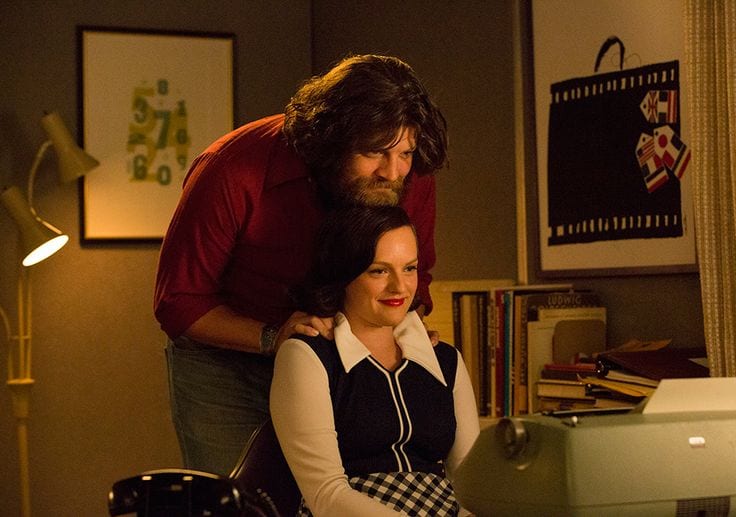
Quiet, mousy Peggy that we were introduced to at the beginning of the series was entirely replaced by the final season. The Peggy of Season 1 would never have walked into her new office days late wearing sunglasses with a cigarette dangling between her lips with a portrait of an octopus orally pleasuring a woman. Peggy is assertive; she’s embraced her dominance by the time the series ends, and she feels comfortable in her skin. Peggy is no longer bending to those around her to make them feel comfortable with a woman being in charge. When she learns that McCann Erickson doesn’t have her office ready and has sent her flowers mistaking her for a secretary, Peggy takes a bold stand, refusing to enter the building until her workspace is prepared. Once it is ready, Roger’s convinces her that she should make her new company wait one more day so she can enjoy a day of drinking with Roger in the cleaned-out SCDP building as they reminisce while roller skating and playing the piano. Peggy and Roger never shared much screen time throughout the series, so it was a unique decision to have them share a final scene in the building that housed the agency Roger founded. Just as Roger is questioning his legacy, no longer having a door with his name on it, Peggy is crafting the legacy she will leave. She hopes to work on a national ad campaign and build something in advertising that outlives her. Even if none of these ambitions come true for Peggy, being able to do what she loves alongside someone who truly values her is an exceptional personal legacy to leave behind to all those that know her.
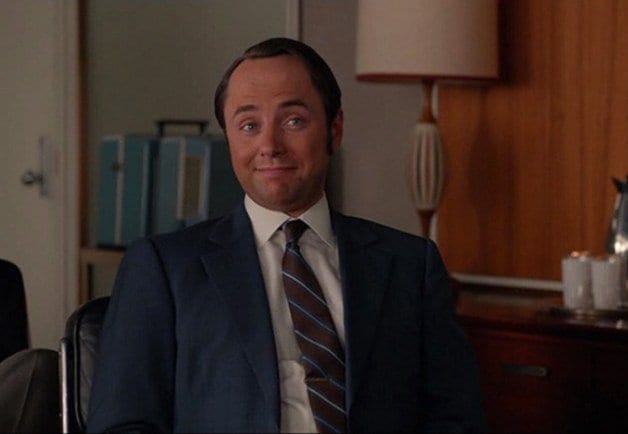
Pete Campbell
Restless and unfulfilled, Pete spends the final two seasons asserting himself over those in a superior position to him, desperate for validation. Don butts heads regularly with the partners of the firm, clearly restless and unfulfilled in his working life. As good as he is at business strategizing and interacting with the clients, he’s a shrewd businessman often going after accounts in secret or without the approval of the partners. When Don thwarts one of his secret business dealings, Pete has a full-on tantrum in the office claiming that Don continually costs the agency money. Don’s behavior has cost the agency money, but what is upsetting Pete is that Don is preventing him from taking the spotlight and being recognized as essential to the company. Being born with a silver spoon has left Pete feeling as though he is owed success and deserves the most significant accounts in the company and any time that notion is disturbed Pete’s anxiety erupts and his fears of inadequacy begin to control him. When Joan brings in a big account that she is then expected to hand over to Pete, he is furious to learn that she instead conducted the meeting without him and earned the business herself. Pete has enough to worry about competing against the other men in his office; finding out that he will also be fighting amongst the women is too much for his fragile, privileged male ego to handle.
Pete wants to be on top; he’s tired of having to share everything positive that happens to him in the company. He’s tired of being embarrassed in pitch meetings and having so much of the business beyond his control. Despite all of his success, Pete himself doesn’t see the extent of his benefit to the company. Several times in the series, we see Pete approached by other agencies to come work for them, and no matter how unhappy he is with SCDP at the time, he never considers leaving. Even after the McCann Erickson merger, Pete seems intent on staying put. After all, the new company is going to give Pete a chance at the national account he’s always wanted. When Duck Phillips relentlessly pursues him for a position with Learjet that promises to be worth more than he could ever make in advertising because it would give him the chance to start over with his family, Pete accepts. His higher salary along with his happiness proves too rich for Pete to pass up and he looks toward building a new life.
This same fear of inadequacy drives Pete to have affairs, desperate for women to find him attractive and flock to him as they do to the other men in the office. Pete engages in a couple of clumsy, awkward affairs throughout his quest for attention. One of the affairs he participates in is with a woman in his neighborhood who shows up beaten and bloody after her husband found out about her affair. Disturbingly, Trudy confesses to Pete that she knew he would have an affair, and expected him to keep his philandering to his apartment in the city rather than in the neighborhood in which she lives. After all, what would the neighbors think if they knew Pete was cheating on her? Trudy is similar to Betty in the way that her primary concern is how others will view her rather than her satisfaction with her own life. When the opportunity arises for Pete to move to the west coast office in California, he eagerly takes it, hoping that the fresh start will lead him to professional and personal happiness. As with each of the others who left New York in hopes of a fresh start in California, Pete was left disappointed only once finding a girlfriend who made him happy, but one that he could not control as he wanted to. Pete misses Trudy, despite how unhappy he was when he was with her, he admits that she brought something to his life that he didn’t know before he needed. The strength and stability Trudy provided Pete proved essential to his life and work.
When Pete approaches Trudy with a desperate plea to follow him to Witchita with their daughter and start over in a completely different area with the house in the country and a yard for their daughter to play in, the wounded and equally unhappy Trudy realizes that Pete brought something to her life that was missing before and longs to have that back. She agrees to the move, and the recommitment and the two seemed destined to enhance each other’s lives, recommitted to the vows they delivered in the first season.

Every professional advancement Pete enjoys only gives him a temporary sense of accomplishment. It took seven whole seasons for Pete to learn — he married Trudy in Season 1 — that his work life wouldn’t bring him fulfillment because it would leave him constantly chasing the next big account. What Pete needed to learn most was the value and benefit of interpersonal relationships and family. Pete had a troubled relationship with his parents, so adapting to his own married life and fatherhood was a greater struggle for him than some. Staying happy in a situation and not looking for something better and feeling unworthy until he found it was a tremendous personal struggle for Pete, as well. Like Don, Pete was called to reinvent himself to make himself whole again and fulfill his legacy but to rebuild his life leaving all the old pieces of himself in the past as to avoid ending up in the same position in the future.
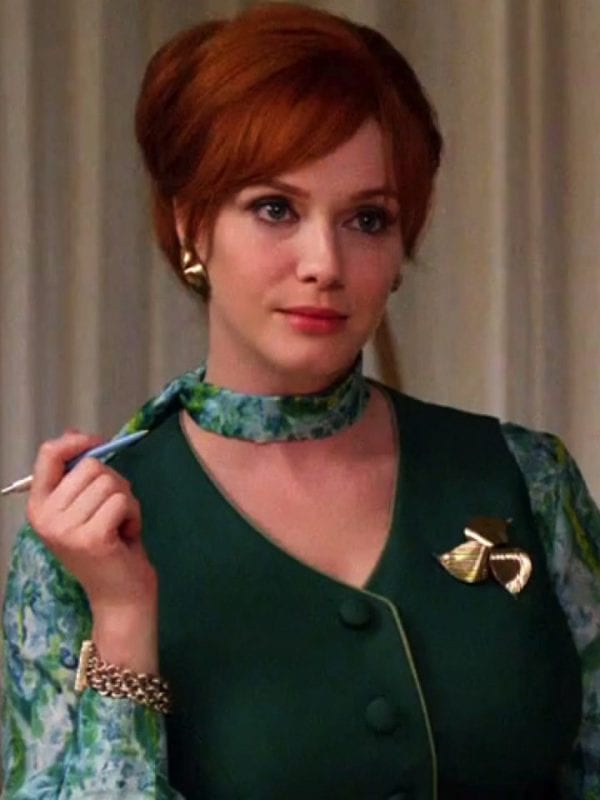
Joan Harris
The constant professional obstructions Joan endured through her 15 years working in the advertising agency makes her legacy of starting her own business all the sweeter. Even after Joan’s actions to make partner, she is still not treated in the same way as the others. Unfortunately for Joan, each partner — and maybe others in the office — know what she did to become one of them, and even though her sacrifice saved the company and set her and her son up for financial independence, she is unfairly criticized for an action that everyone in the company wanted to happen. Harry blatantly calls Joan out during an argument for how she got her partnership, which in a way is better for Joan because at least he says aloud what she assumes most others to be thinking. Joan is undermined, has her decisions reversed, isn’t considered in business dealings as diligently as the men are, and still expected to do the office management work and often treated as a glorified secretary. Joan promotes Dawn to office manager when she is caught forging a co-worker’s time card who asked her to punch her out when Dawn left for the day. Dawn apologizes and takes more blame than the employee who asked her to do it and Joan knows Dawn is a good worker and can be trusted. Making her office manager clears Joan’s plate from a lot of the work that is beneath her scale as a partner and necessitates her getting a real office and being taken seriously.
Joan is often hurt and upset by Don with whom she has a long history as the two of them are the longest tenured employees other than the founding partners at SCDP. Don’s impulsive actions have an adverse effect on Joan. When she learns that he fired Jaguar her response is “If I can work with him, Don, you should have been able to.” Don’s heart may have been in the right place, and Herb indeed was a bully, but it wasn’t his place to end a business relationship with a client that brought so much revenue to the agency that they were to acquire at such a hefty price to Joan. Even when Joan acts alone bringing in new clients to the agency and builds a personal relationship with them, she is still expected to abandon the account to a man for maintenance. Unlike Peggy, Joan doesn’t want to be a copywriter. She intends to work accounts, a job that’s even harder for a woman to break into. No matter what company she is with, as her brief time full of sexual harassment at McCann Erickson concludes, Joan doesn’t believe she will able to work in accounts and must go into business herself if she wishes to gain the respect she has earned.
Joan has determined herself to no longer be left as only an option to be considered for the men in her life. She broke things off with Roger when she realized she was just something available to him when he felt the whim. She turned down Bob Benson’s proposal to marry him, a closeted gay man, so he could look like the family man clients expected and so Joan could be taken care of financially, as Bob would send money for her and her son’s care. Bob thought he was doing Joan a favor as she was getting older and he felt she should be more realistic about her chances at finding a mate at the stage of her life. Joan refused to be influenced by such a bleak outlook that she promised Bob she would rather die alone looking for true love than to settle for anything less. Joan found a great man in the final season of the show, that not only truly valued her, but wanted to help her achieve her goals and reach her potential. He could recognize Joan’s business sense and her people skills, but as much as he supported her career ambitions, he still expected to be the number one in her life. He almost left her once he realized she had a child, to which Joan responded by leaving herself before he could. When Joan launches her company, and he gives her the ultimatum of him or the business, Joan says goodbye. The Joan in the first season of the series who told girls if they’re lucky they’ll find a husband and won’t have to work at all would never have started a company and given up a chance of love for the business.
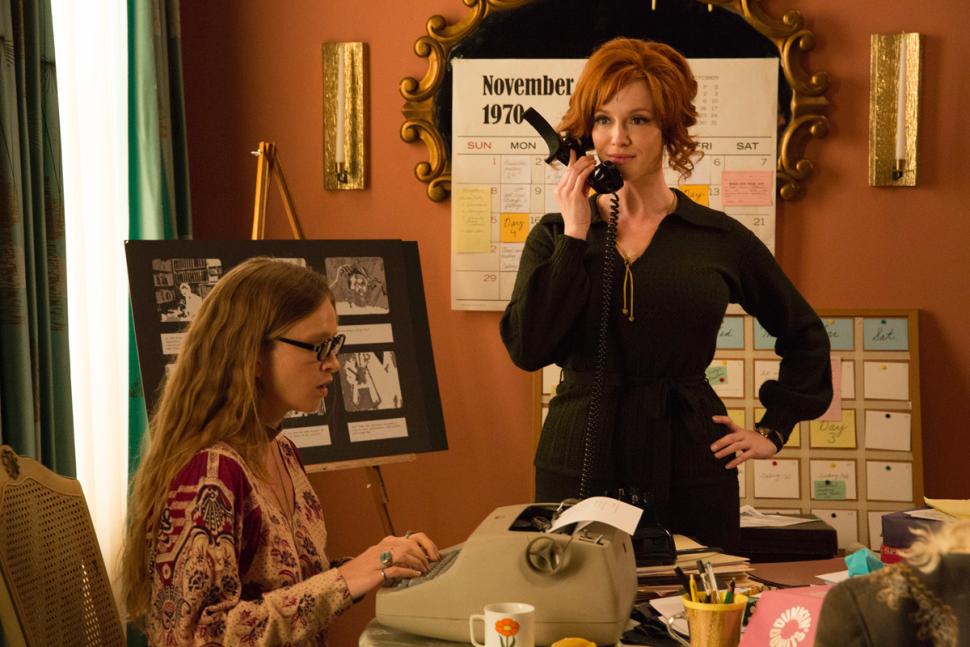
Joan’s growth and the embrace of her independence is a powerful personal legacy and one that her son can look up to and aspire towards. Living life on her terms, and being self-aware enough along the way to adjust her expectations, advice she initially gave Peggy, Joan has created a life for herself and her son that she is proud of. Being fulfilled and appreciated for the unique gifts she brings to her business dealings is a far cry from the Joan who was only talked about in terms of her body throughout the series. Unfortunately, even though nine years have passed since Joan’s introduction, she will still have to fight against sexism, as even in the final season she was told by a photographer to stand pretty and look like she was thinking of something important. Armed with enough self-worth and validation, however, we get the impression that Joan and her legacy will be just fine.

Betty Francis
Sally and Betty continue to bitterly bicker as the sixth season of Mad Men opens, but Sally has a friend that she thinks could positively influence her. Her friend, Sandy, is a violin player and seems to be an exceptional student at Sally’s high school. The entire family enjoys her company and her music. One evening when Sally is gone, Sandy has a discussion with Betty. Betty asks Sandy about her preparations for Julliard as she has told them she is leaving to attend the school soon. Sandy admits to Betty that she isn’t going to Julliard, and instead is planning on moving to Greenwich Village and live on her own. Assuming Sandy to be lost after the recent death of her mother, Betty helps her by relaying her own story of loss after her mother passed away. Sandy is calm and straightforward with Betty, ensuring her that her desire to get away has nothing to do with her mother’s death and everything to do with her unwillingness to live a life in the city where getting married and becoming a housewife is the ultimate goal. Betty is fascinated by Sandy’s independence and her refusal of the kind of life that Betty has made for herself which is why when she runs away, telling everyone she has gone to Julliard, Betty sets about The Village in a desperate plea to find her.
Finding her becomes a crusade to Betty, partly because she is captivated by her assuredness and choices, but also because she wants so badly to be the mother to this girl that she hasn’t been to her own children. Betty tracks down someone who bought Sandy’s violin and waits at the apartment for the last person who saw her to return home. While in the apartment with no heat and rats trampling about on the floor, Betty teaches the young boys who live there how to cook, sharing recipes and giving advice like any mother would. Betty wants to be a mother, and she tries diligently, but her lack of a positive motherly example hinders her efforts. One of the boys convinces Betty that Sandy doesn’t want to be found, calls her a bottle-blonde and asks her to leave. Betty is prompted by this conversation to dye her hair brown, surprising her entire family. This quest of Betty’s that opened the sixth season illustrates her caring sensibilities beneath her stern exterior proving her to be a better-equipped mother than most have given her credit for. When Sally comes to Betty asking to go to boarding school, Betty agrees, seeing this as an opportunity for Sally to gain friends and independence and get the distance she so desires from her family.
Betty doesn’t feel connected to her children; she tells Don this during the night they spend together when visiting Bobby’s summer camp. Their night together also reveals something that hasn’t changed within Betty: her worth as a woman being defined by her feminine attributes and attractiveness. Her weight gain affected her deeply, and even though she had lost the weight, she still needed men to tell or show her that they are still attracted to her. She needed to hear it from Don, and she needed to feel attractive at an event for Henry. As she has done before, Betty dressed for an event she attended with Henry and was come onto, and though she verbally told the man she was married and would not be pursuing his advances, her body language suggested otherwise. This incident ruffled Henry and the two argued briefly before having sex in the back of their car on the way home from the fundraiser. At a later event, Betty voices her opinion on a political matter that is in opposition to Henry’s boss causing Henry to become angry at Betty. Implying that she isn’t supposed to talk and only to look pretty and support him, Betty has had enough. Shortly after this incident she shares that she has signed up for graduate school stating that it was something she has always wanted to do for herself. Finally, Betty is taking control of her life, putting some focus on herself and embracing her independence.
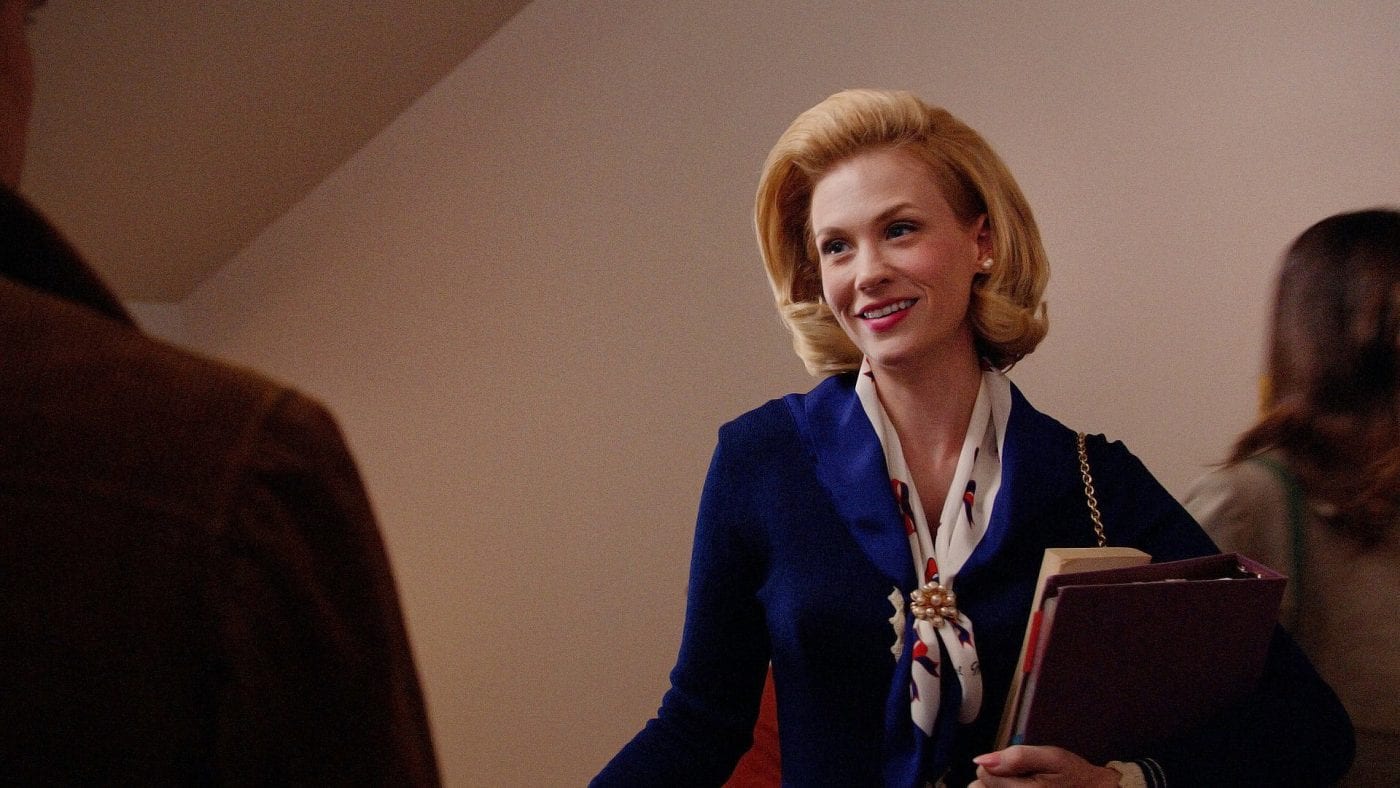
Her trip to Greenwich Village exposed the prim and proper Betty to a way of living that she had never encountered before. Her exposure leads to no such enlightenment, however, regarding social issues or those impacted by the civil unrest the world around her was experiencing. Betty, whose husband was constantly around politicians and running for office himself, constantly exposed to the riots and violence around them is still completely insulated by any happenings in the world that she may be uncomfortable with. Even though riots have overtaken the streets, Betty sees that as no reason Don shouldn’t drive his children to his apartment to spend the weekend with him. Betty is less concerned with shielding her children from the horrors of violence than she is in teaching Don a lesson, revealing that she hasn’t made much progress in letting things go with Don. When Betty visits with Francine, her friend that we often saw at the Draper house in the earlier seasons in the series, she learns that Francine is enjoying success as a travel agent. Francine appreciates the challenge of working and taking care of her children and maintaining her home. All of those tasks are too overwhelming for Betty, though she is inspired to volunteer as a chaperone for Bobby’s fieldtrip. The field trip to the farm is a fun day and everything is going smoothly until Bobby trades a sandwich that was intended for Betty for some gumdrops. Betty perceives this as an act of disrespect that ruins the entire day. Betty is sour toward Bobby for the rest of the evening and the audience is reminded how much Betty is impacted by the many unexpected aspects of parenthood.
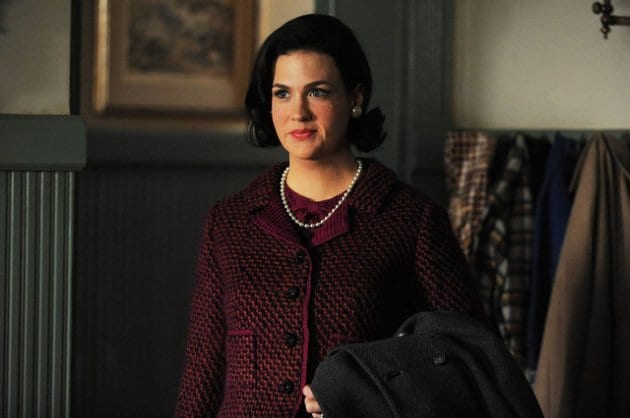
Betty unexpectedly becomes the character in the series that has the most pressing reason to decide what legacy she wants to leave. After some pain and a fall at her college campus, Betty learns that she has lung cancer. Henry, who drove to the hospital before Betty was given the news, becomes irate that the doctor scared Betty with the news and is determined to get a second opinion and a different diagnosis. Betty handles the diagnosis quietly and serenely, while Henry jumps through hoops using his connections to get Betty seen by the best doctors. When the diagnosis is confirmed and the prognosis terminal, Betty is given mere months to live. Betty takes the news in stride and elects to refuse treatment believing that the stress on the family and the damage the treatment will do to her body isn’t worth the extra months to live while feeling miserable. Her decision angers Henry so much that he breaks her confidence and tells Sally the news, hoping that bringing her home to talk to Betty will convince her to change her mind. Henry admits to Sally that he doesn’t know what he will do without Betty. Sally must face the reality that she and her young brothers will have to go through the rest of their lives without a mother, and she quickly becomes a caretaker to her family. Betty writes Sally a note detailing how to handle her funeral arrangements and what to do with she and her siblings after Betty’s passing. Betty has deemed that Don’s constant absences, drinking, and work commitments don’t make him the ideal single dad to raise three children. Betty wants as little to change for Sally, Bobby, and Gene as possible, and their father being around constantly would be a big change. She wants her children to stay with her brother and his family and after much initial disagreement from Henry and Don, they eventually promise Betty that they will adhere to her wishes. The fact that the men came around and agreed to follow Betty’s desires for the future is a huge arc in Betty’s life, as she has been undermined or ignored for most of the show’s run. Betty’s legacy will be her children and Henry, and how they function without her. Will the lessons and experiences she filled their lives with leave them with happy memories and fulfilled lives? Only time will tell, but what can be ascertained from watching Betty through the series run is that she tried her best to live for her kids, even when the idea of parenting felt insurmountable.
Death and the purpose and truth of one’s life dominated the entire series of Mad Men, but especially the final two seasons the show. As each character dealt with the generation they were positioned in, and the troubles that existed during a decade marked by the shift in American ideals and values, they learned themselves and faced the dualities of their nature. In addition to deciding if it was more important to live the lives they wanted to live rather than the lives society dictated them to live. Discovering what they really wanted was a difficult journey as most of the characters lived a life that was contrary to their nature. Such introspective reflection, and the action it leads to, dictates a person’s legacy. The ability to live a true and genuine life creates a personal legacy that impacts anyone that you interact with, and is the only way to discern what you truly want. We saw many characters change their goals once they had that which they thought they wanted and realized these ambitions weren’t satisfying. Coming to peace with oneself is a natural byproduct of such reflection. Despite all the problems we saw each character encounter throughout their lives, the series ended with each of them seeming to be at peace with themselves, how they lived, and their futures. Even Betty was at peace despite knowing that she didn’t have much time left on earth because her children’s future was set. The tranquility and contentment evident in each character upon the series conclusion was a powerful way to illustrate to the audience that no matter what happens in life, there is always an opportunity to search for truths within ourselves that leads to the ‘aha’ moment of self-acceptance that enriches our lives and cements our personal legacy.
